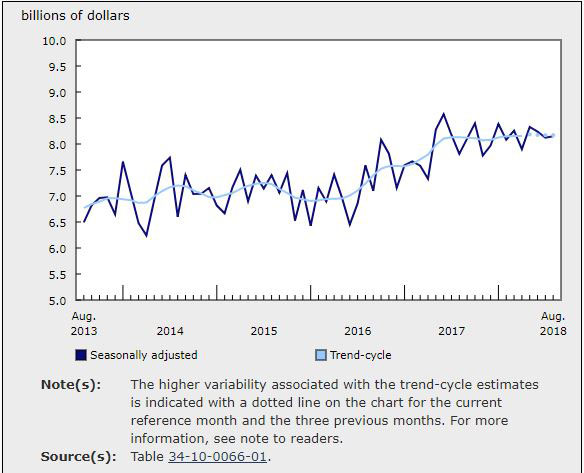Value of August Building Permits Rose 0.4% over July

Oct 21, 2018
Canadian municipalities issued $8.1 billion worth of building permits in August, up 0.4% from July. Strength in the non-residential sector drove the increase, while the residential sector declined for the third consecutive month.
Non-residential sector: high value projects drive the increase
In the non-residential sector, $3.2 billion worth of permits were issued in August, up 8.8% from the previous month. Both the institutional (+25.8%) and commercial (+8.9%) components contributed to the gain, which was largely the result of the issuance of permits for a new hospital in Ontario and new office buildings in British Columbia.
Meanwhile, the value of industrial permits fell 5.9% in August to $677 million. This followed a 13.4% gain in July, as multiple permits were issued that month for transportation terminals and manufacturing structures in Ontario and Alberta.
Residential sector: third consecutive month of declines for both components
Municipalities issued $5.0 billion worth of residential permits in August, down 4.4% from July and marking the third consecutive monthly decline for the sector. Five of the six provinces that posted decreases had lower intentions for both single and multi-family construction.
The value of permits for single-family dwellings was down 5.2% to $2.2 billion, maintaining the general downward trend that began in January 2018. While eight provinces posted decreases in the month, Ontario and British Columbia contributed the most to the decline.
In the multi-family dwelling component, the value of permits fell 3.8% to $2.7 billion. Despite the monthly decline, the year-to-date value was $3.5 billion higher than the same time last year. Multi-family dwellings have represented over 70% of the total units for six of eight months so far this year. There are no previous years on record where multi-units exceeded that level.
Provinces and census metropolitan areas: British Columbia reaches another record high
In August, only three provinces reported gains, led by a record high in British Columbia. The largest decline occurred in Ontario, due to lower construction intentions in the residential sector.
The value of permits in British Columbia reached a record high of $1.8 billion in August, 12.8% above the previous record set in March 2018. In the non-residential sector, the value of permits passed the $600-million mark for the first time. Large projects for office buildings in the Vancouver census metropolitan area (CMA) were largely responsible for the growth.
In the CMA of Vancouver, the value of permits rose 66.4% to $1.4 billion in August, accounting for three-quarters of the value in British Columbia. Although most of the increase came from the City of Vancouver, the City of Burnaby issued over $250 million worth of permits for apartment buildings, bringing the total to over $800 million for the year.
In Ontario, all components declined in August, except institutional buildings. The value of permits in the residential sector dropped 13.9%. This followed several strong months in the multi-family dwelling component. At the CMA level, the value of residential permits in Ottawa fell 60.9% in August, following a 59.9% gain in July. This was due to the implementation of higher development fees in the city, as developers applied for permits ahead of August’s fee increase.
Source: Statistics Canada, https://www150.statcan.gc.ca/n1/daily-quotidien/181010/dq181010a-eng.htm





![Guide to the Canadian Electrical Code, Part 1[i], 26th Edition– A Road Map: Section 56](https://electricalindustry.ca/wp-content/uploads/2022/11/Guide-CE-Code-2-768x432.png)




![Guide to the Canadian Electrical Code, Part 1[i], 26th Edition– A Road Map: Section 56](https://electricalindustry.ca/wp-content/uploads/2022/11/Guide-CE-Code-2.png)



